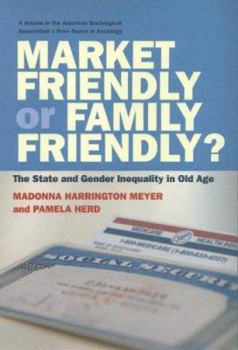Market Friendly or Family Friendly?: The State and Gender Inequality in Old Age
Select Format
Select Condition 
Book Overview
Poverty among the elderly is sharply gendered--women over sixty-five are twice as likely as men to live below the poverty line. Older women receive smaller Social Security payments and are less likely... This description may be from another edition of this product.
Format:Hardcover
Language:English
ISBN:0871545985
ISBN13:9780871545985
Release Date:August 2007
Publisher:Russell Sage Foundation
Length:227 Pages
Weight:1.01 lbs.
Dimensions:0.9" x 6.4" x 9.2"
Customer Reviews
1 rating
Are policies family friendly?
Published by Thriftbooks.com User , 16 years ago
In Market Friendly or Family Friendly? Harrington Meyer and Herd analyze the impact of old age policies already in place and consider the extent to which they are market friendly or family friendly. More specifically, they argue that welfare states programs are increasingly designed to be maximally useful to, and friendly toward, the market, rather than to families. They develop this thesis in the first two chapters of the book and then use the remaining chapters to systematically explore the impact of the transition toward market friendly policies in old age policies and health policies. In particular, they consider the factors that shape women's economic situation across the life course and analyze the impact of public and private pensions and a wide array of health benefits on racial and gender inequality in old age. They convincingly demonstrate that the U.S. has not altered the welfare state to make it more responsive to changing dynamics such as decreasing marital rates and increasing women's employment rates. Instead, the policy agenda has been dominated by efforts to decrease the role of government and outsource social provision to private corporations. Harrington Meyer and Herd evaluate policy reforms according to one criterion -- the degree to which they curb inequality in old age. They disagree with those who argue that strengthening markets will ultimately lead to increased well-being among older people. Rather, Harrington Meyer and Herd believe that privatizing the welfare state may instead be introducing new risks. They argue that instead of privatizing Social Security, we should make it more responsive to changing demographic trends. Given the growing race gap in marriage, they support the introduction of a generous minimum benefit and the elimination of benefits linked to marital status. And instead of privatizing Medicare, they favor a single payer solution for people of all ages. This book is destined to be widely read and highly cited.





